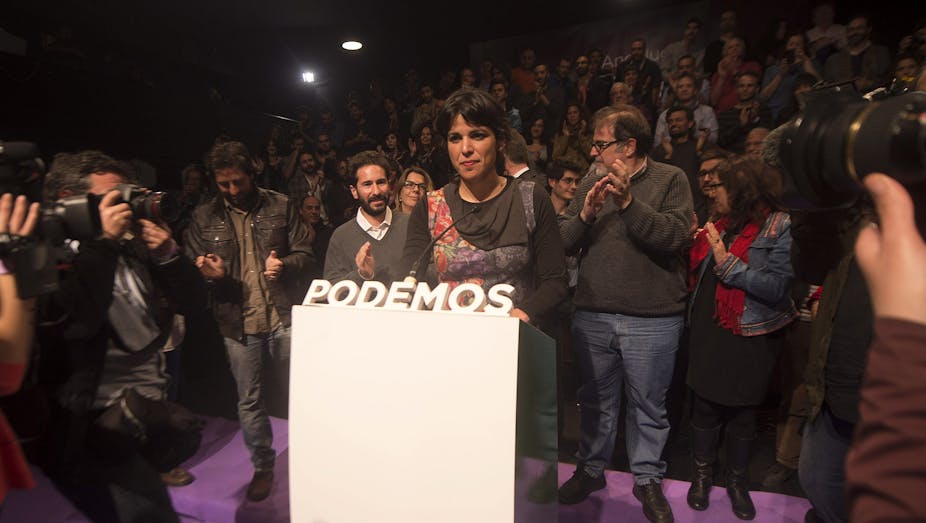The Andalusian regional elections held on March 22 were the first of a series of key elections in Spain throughout the course of 2015. Local and regional elections will be held in 13 of Spain’s 17 autonomous regions in May, followed by the Catalan regional elections in September and the general election at the end of the year.
Opinion polls spell trouble for the two parties which have held the monopoly of power since 1982: the People’s Party (PP) and the Spanish Socialist Workers’ Party (PSOE). Both are starting to lose their dominance over a hitherto immutable two-party system.
Instead, all eyes have been on the two newcomers to the Spanish political scene: Podemos (We Can) and Ciudadanos (Citizens).
Podemos, founded in early 2014 on an anti-austerity platform not unlike that of Greece’s governing Syriza, threatens the PSOE’s left flank, while Ciudadanos, a centre-right force established a decade ago in reaction to burgeoning Catalan nationalism, shows every sign of eating into the PP’s vote.
A recent opinion poll indicated that the PSOE, PP, Podemos and Ciudadanos each command within a point or two of 20% of the national vote, a situation unheard of since Spain’s democracy was re-established following Franco’s death in 1975. But reports of the death of two-party rule have nevertheless proved to be premature, at least as far as Andalusia is concerned.
Not so fast
The region, Spain’s largest, is an old Socialist stronghold, and the party has been in government there for the past 33 years without interruption. In 2015 the Socialists won 47 seats, exactly what the party netted at the previous elections in 2012.
The PSOE’s regional president, Susana Díaz, can feel justified in her decision to bring forward the elections almost a year before they were due. While she came up eight seats short of an overall majority, she has provided the PSOE with its first election victory since the party won the 2008 general election. In the process she has consolidated her position as one of the party’s key figures and is potentially positioning herself to take over the leadership of the party at the national level from Pedro Sánchez, who has largely failed to convince since being elected the PSOE general secretary in July 2014.
That said, the PSOE’s 35% share marks a historic low for the Andalusian party. And given that Díaz, during the course of the campaign, ruled out striking a post-election deal with either the PP or Podemos, it remains to be seen whether she is prepared to approach Albert Rivera’s Ciudadanos – if, indeed, Ciudadanos is prepared to be wooed.

While that party’s nine seats would offer the PSOE a solid majority, it is by no means certain that the current term will be any more stable than the acrimonious last one.
Collapse
The PP, meanwhile, has even more cause for concern. At the 2012 elections, it won the largest share of the vote and the most seats, only to be denied office in Andalusia for the first time by a PSOE-United Left alliance. But in 2015, the party retained only two-thirds of its vote share, pulling in just 27%, for a loss of 17 seats.
This is the party’s worst result in the region for two decades – and it will give the prime minister, Mariano Rajoy, serious food for thought in the months before the general election. He will be particularly concerned by the breakthrough of Ciudadanos beyond its Catalan heartland.
The PP has never had to worry much about competition on the centre-right of the political spectrum. Given that Ciudadanos appears to have won its nine new seats in Andalusia by appealing to disaffected PP supporters, significant national losses could still be looming.
It is nevertheless worth noting that at the national level, the PP electorate has remained remarkably loyal over the past two decades with the party invariably winning more than 10m votes at successive general elections. In contrast, the PSOE vote during the same period has been much more volatile.
As for Podemos, the PSOE’s resilience in Andalusia has, for the time being, frustrated – or at least delayed – the party’s consolidation as a major player on the Spanish political scene.
The caravan nevertheless moves on to the local and regional elections to be held in May, a series of polls which may well prove to be more favourable to Pablo Iglesias and his anti-austerity message.

